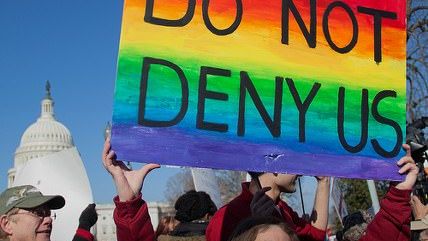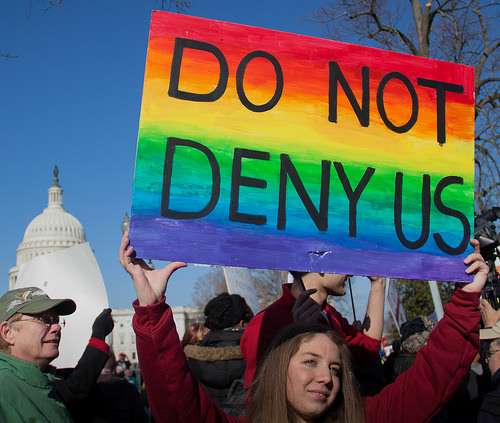Four Changes the DOMA Ruling Has Wrought
Benefits, immigration changes, and ammunition for future challenges


On June 26 the Supreme Court ruled unconstitutional the portion of the Defense of Marriage Act (DOMA) that barred the federal government from recognizing same-sex marriages in states where they were legal.
The change has a huge impact on the lives of gay couples living in states where their marriages are recognized. Ultimately it may even have just as great an impact in states where they are not. Here's a quick summary of four consequences coming as a result of the DOMA ruling.
1. Federal benefit expansion
Of course, the biggest, most obvious change is that married gay couples qualify for whatever benefits or special treatments the federal government extends to their heterosexual counterparts (including tax penalties). The lawsuit that led to the DOMA ruling revolved around the case of a lesbian couple in New York and their desire to get the same estate tax exemption for surviving spouses as heterosexuals. When Edith Windsor's wife, Thea Spyer, died in 2009, Windsor was ordered by the IRS to pay more than $350,000 in estate taxes she wouldn't have if the federal government recognized their marriage.
Spousal and Social Security survivor benefits, and more than 1,000 federally recognized benefits that are tied to marital status, will be extended to couples in states where gay marriage is legalized. The massive federal bureaucracy being how it is, though, means that the benefit discrepancy that inspired the lawsuit may be the slowest to actually change. The Nation notes:
What's not as clear is how many of those benefits can be quickly extended to same-sex couples. In particular, the Social Security Administration and the Department of Veterans Affairs have some thorny rules that may leave elderly couples and gay veterans in a legal no-man's land for years to come.
"These two areas are of quite a bit of significance," said Susan Sommer, the director of constitutional litigation at Lambda Legal, the country's oldest gay-rights firm. Sommer noted that it's too early to say exactly what options the executive branch has for extending VA and Social Security benefits to all same-sex spouses in spite of the statutes. "It may well be a different process and higher hurdles."
Complicating matters a bit for federal employees, the Office of Personnel Management announced Monday that workers in states that have civil unions but not formally recognized same-sex marriages will not qualify for benefits.
President Barack Obama and the Justice Department are urging changes to be implemented "swiftly and smoothly," but we're talking about agencies like the IRS and the Social Security Administration here. "Swift" and "smooth" are not words commonly associated with them.
2. The Green Cards Are Coming
One area where the feds are moving at a faster pace to implementing changes to recognize same-sex couples is immigration. The weekend after the Supreme Court ruling, Traian Popov, a Bulgarian immigrant living in Florida who legally married husband Julian Marsh in New York, received notice his permanent residence visa had been approved.
Right after the DOMA ruling, Department of Homeland Security Secretary Janet Napolitano issued a statement saying, "I have directed U.S. Citizenship and Immigration Services (USCIS) to review immigration visa petitions filed on behalf of a same-sex spouse in the same manner as those filed on behalf of an opposite-sex spouse." Just like that. Consider how much of a nightmare legal immigration is in all other ways. The change also eliminated one source of conflict for the proposed immigration reform bill. Democrats had wanted same-sex couple recognition, but Republicans balked. The fight threatened the whole process. The DOMA ruling makes the battle moot. Now they can fight over every other part of the bill.
3. The Service Ban Was Just Removed, and Now Military Spouses Will Be Acknowledged
After the huge struggle to get rid of "Don't Ask, Don't Tell," the military's response to the DOMA decision has been to salute and get on with it. Defense Secretary Chuck Hagel immediately announced that the Department of Defense would immediately get to work on changing policies. This will extend military benefits and housing to spouses, health care and access to base facilities. And when they die, spouses will get to be buried next to their loved ones in Arlington National Cemetery. As The Nation noted, though, there may be some hiccups with getting the Veterans Administration-based benefits squared away.
4. Kennedy Provides More Ammunition to Fight State Gay Marriage Bans
The Supreme Court ruling struck down only the part of the Defense of Marriage Act that impacts federal recognition of same-sex marriage. It had no direct impact on gay marriage recognition in states where it is banned, and the part of the act that permits states to refuse to recognize gay marriages performed in other states was not addressed.
But the language Justice Anthony Kennedy used in the majority decision of United States v. Windsor is being used to try to challenge other marriage bans. The Associated Press notes:
In the June 26 decision in U.S. v. Windsor, Kennedy said the provision denying federal benefits to legally married same-sex couples relegates those marriages to second-class status, and "it humiliates tens of thousands of children now being raised by same-sex couples."
He framed his argument with reference to states' "historic and essential authority to define the marital relation."
But it doesn't take too much creativity to reframe his opinion to challenge state bans on same-sex marriage, said Jon Davidson, legal director of the gay rights group Lambda Legal.
"It's stigmatizing and it's harmful to people and particularly harmful to children when their parents' relationship is treated as inferior by the government. Those points are points we will be making in all of our marriage cases," Davidson said.
Davidson's group is relying on the invalidation of the Defense of Marriage Act provision in a state lawsuit to force New Jersey to allow same-sex couples to wed. In that case, the new argument is that the New Jersey Constitution does not allow the state to essentially keep same-sex couples from receiving federal benefits by prohibiting them from marrying.
Kennedy's was the swing vote everybody was watching for. The other justices voted pretty much exactly as predicted even before oral arguments were presented. His language in the majority opinion gave a lot of ammo for calling it a precedent that the state does not have a legitimate reason for denying marriage recognition for same-sex couple. And so his words are pushing the state battles forward.
